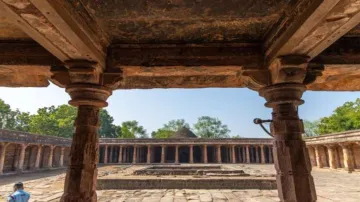Bhojshala temple at Madhya Pradesh's Dhar has a Muslim connection too | Know details
Bhojshala complex, which is considered a temple dedicated to Vagdevi (Goddess Saraswati) by Hindus and a mosque named after Kamal Maula by Muslims, is a hot topic for politicians in the election season as they eye political gains by raking up the issue.

Even though mandir-masjid (mosque-temple) issues are not considered very healthy for a plural society like ours, in the contemporary politics of India, the communal topic has become very effective, especially during election seasons. The country just took a sigh of relief with the inauguration of the historic Ram temple in Ayodhya as it marked the ending of centuries-old Hindu-Muslim dispute, but, our politics is far away from getting a complete separation from the controversial issues that have an impact of social fabric as well. From Mathura's Shahi Idgah mosque case to the Gyanvapi case to Dhar's Bhojshala, there are several politics-laced legal issues pending in the court which are yet to be settled. In these cases, it is very difficult to conclude who is right and who is wrong as both sides have their arguments and the politicians leave no stone unturned to draw political gains from these disputes.
The Bhojshala case is one such case that is a burning topic in Madhya Pradesh politics. The Bhojshala complex has a link to Raja Bhoja (1000-1055 AD). Some Hindu organisations claim that the disputed monument of Bhojshala is a temple of Goddess Vagdevi (Saraswati).
What is the current status of legal battle?
What is the historical significance of the Bhojshala complex?
The remains of the Bhojshala or Saraswati temple were later converted into a mosque by the Muslim ruler renaming it Kamal Maulana Mosque. The mosque has a large open courtyard around which there is a verandah decorated with pillars and a prayer hall is located behind it in the west. The carved pillars used in the mosque and the exquisitely carved ceiling of the prayer hall were from Bhojshal. Valuable works engraved on the stones in the walls of the mosque have been recovered.
In these rocks, two hymns written in Prakrit language of the Karmavatar or crocodile incarnation of Vishnu are engraved. Two Sarpabandha pillar inscriptions, one containing the Sanskrit alphabet and the main endings of nouns and verbs and the other containing the individual declensions of the ten tenses and moods of Sanskrit grammar.
Bhojshala complex- A symbol of harmony
The ASI-protected monument, which Hindus believe is a temple of Goddess Vagdevi, while the Muslim community treats it as Kamal Maula Mosque is a shining symbol of harmony. Abiding by an ASI order issued on April 7, 2003, Hindus are allowed to worship inside the Bhojshala complex every Tuesday, while Muslims are allowed to offer namaz at the site every Friday.
What is the Muslim side's stand?
The Maulana Kamaluddin Welfare Society is taking care the issue from the Muslim sides in the court. The Muslim body objected to the Hindu group's application in the court. On behalf of the Mulsim community, a writ appeal on the Bhojshala dispute was submitted which is already pending before the principal bench of the High Court at Jabalpur and the ASI's order dated April 7, 2003.
Also read: Supreme Court refuses to stay ASI's 'scientific survey' of Bhojshala complex in MP's Dhar